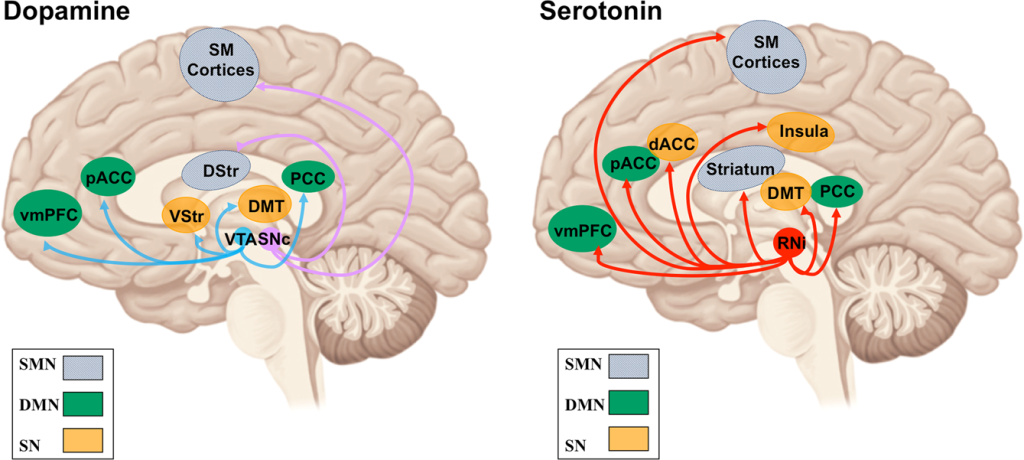Buy Shrooms, CBD, LSD
🧠 How Functional Mushrooms Affect Neurotransmitters Like Serotonin and Dopamine
The Mind-Mushroom Connection Explained
In the modern wellness world, functional mushrooms like Lion’s Mane, Reishi, and Cordyceps are being recognized for more than their physical health benefits. A growing body of evidence and tradition suggests that these fungi may also support mental well-being—not just through stress reduction, but by influencing the very neurotransmitters that shape our thoughts, mood, and motivation.
The question is: Can mushrooms actually affect brain chemistry?
Let’s explore how functional mushrooms interact with key neurotransmitters like serotonin and dopamine, and what that means for mood, focus, and emotional resilience.
🧬 What Are Neurotransmitters?
Neurotransmitters are chemical messengers used by the brain and nervous system to communicate. Two of the most important for mood and motivation are:
🔹 Serotonin – The “feel-good” neurotransmitter
Regulates mood, sleep, appetite, digestion, and emotional stability.
🔸 Dopamine – The “motivation and reward” chemical
Controls pleasure, attention, movement, and drive.
An imbalance in either can lead to issues like anxiety, depression, fatigue, and brain fog. While antidepressants and stimulants are commonly used to modulate these chemicals, researchers and herbalists alike are exploring natural ways—and mushrooms are part of that picture.
🍄 1. Lion’s Mane and Neurogenesis-Linked Mood Support
Lion’s Mane (Hericium erinaceus) is best known for stimulating nerve growth factor (NGF), which supports neuroplasticity and brain regeneration. But its influence may go deeper.
Here’s what research suggests:
- By stimulating new neuron growth, Lion’s Mane may help repair areas of the brain linked to mood regulation.
- Some animal studies suggest that Lion’s Mane reduces depression and anxiety-like behavior by modulating hippocampal neurogenesis (a region tied to serotonin activity).
- It may also enhance dopamine and serotonin receptor activity, helping neurotransmitters do their job more efficiently.
Human evidence:
A 2010 Japanese study found that menopausal women who consumed Lion’s Mane cookies daily experienced less anxiety and irritation, possibly due to enhanced neurotransmitter function.
🧠 While it doesn’t directly supply serotonin or dopamine, Lion’s Mane appears to optimize the brain’s ability to produce and respond to them.
🌿 2. Reishi and Serotonin Regulation for Calm and Sleep
Reishi (Ganoderma lucidum) is an adaptogenic mushroom known for promoting relaxation, emotional balance, and better sleep—all outcomes tied to serotonin regulation.
Possible effects on neurotransmitters:
- Enhances serotonin availability by regulating monoamine oxidase (MAO) activity—an enzyme that breaks down serotonin and dopamine.
- May support GABA activity as well, helping counter overstimulation in the nervous system.
- Helps balance cortisol, the stress hormone that can suppress serotonin production if chronically elevated.
Traditional use:
In Traditional Chinese Medicine (TCM), Reishi is called the “mushroom of spiritual potency”, long used to soothe the heart and calm the mind—a poetic way of describing its modulation of brain chemistry.
😴 Reishi is especially useful for people dealing with anxiety, stress-related insomnia, or emotional dysregulation.
⚡ 3. Cordyceps and Dopamine-Driven Motivation
Cordyceps militaris and sinensis are mushrooms known for boosting physical energy, libido, and stamina—but they also play a role in mental energy and dopamine-driven reward pathways.
How Cordyceps may help:
- Enhances ATP production (cellular energy), indirectly supporting dopamine synthesis and motivation
- Some studies suggest it may protect dopamine neurons from oxidative damage—important in conditions like Parkinson’s disease
- Improves blood flow and oxygenation, delivering more nutrients to the brain for neurotransmitter production
🔋 For people struggling with low motivation, fatigue, or brain fog, Cordyceps may provide a clean, natural lift—without overstimulating the nervous system like caffeine.
🦠 4. Gut-Brain Axis: Mushrooms, Serotonin & Microbiome Health
Up to 90% of serotonin is produced in the gut, and recent studies show that gut bacteria directly influence neurotransmitter levels. Functional mushrooms like Turkey Tail and Chaga act as prebiotics, helping to feed good gut microbes and support this gut-brain loop.
Turkey Tail and gut health:
- Promotes microbiome diversity, which is linked to better serotonin regulation
- Supports gut lining health, preventing “leaky gut” which can trigger mood swings and inflammation-related mental fog
🌱 Healthier gut = healthier mood = more balanced neurotransmitters.
⚠️ Are Mushrooms a Replacement for Antidepressants?
While promising, mushrooms are not a replacement for psychiatric medication—especially in severe cases. However, they can be powerful adjunct tools for:
- Supporting emotional resilience
- Easing symptoms of stress or mild mood imbalance
- Enhancing the effectiveness of therapy and lifestyle changes
Always consult a healthcare provider before making changes to your mental health regimen.
🧭 Final Thoughts
Functional mushrooms do more than support the immune system or fight inflammation—they also offer a profound natural synergy with brain chemistry. By supporting serotonin, dopamine, and nerve growth indirectly, mushrooms like Lion’s Mane, Reishi, Cordyceps, and Turkey Tail may help promote a calm, focused, and emotionally balanced state of mind.
🍄 Nature doesn’t need to be loud to be powerful. In the quiet world of mushrooms, the foundation for brain balance is being built—one neural connection at a time.

